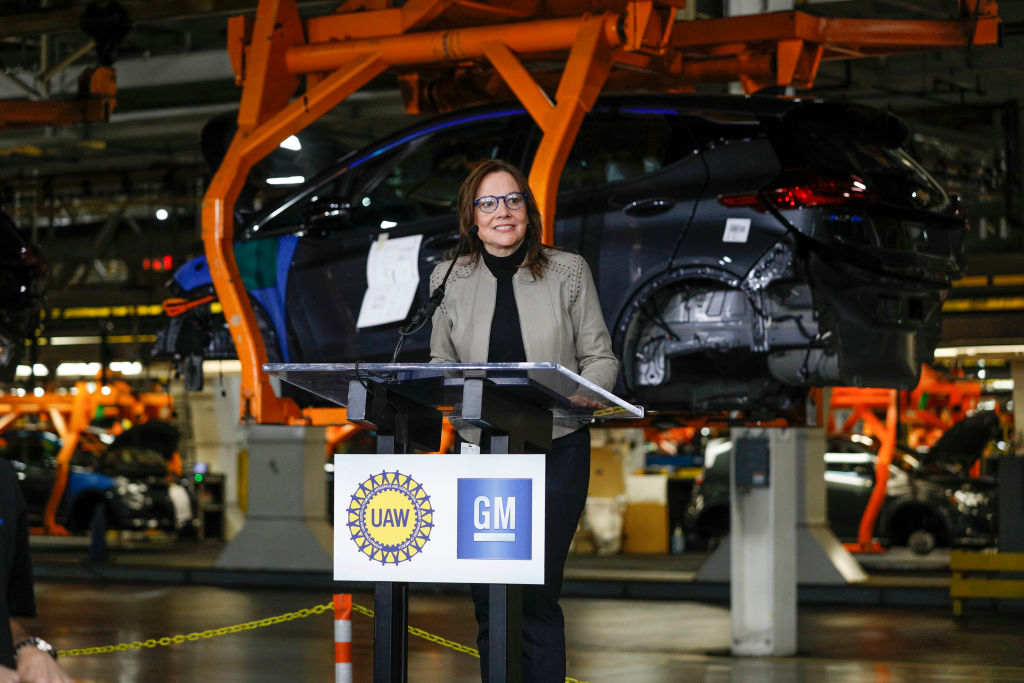GM dumps Trump pollution fight, abruptly sides with Biden and California


A free daily email with the biggest news stories of the day – and the best features from TheWeek.com
You are now subscribed
Your newsletter sign-up was successful
General Motors CEO Mary Barra threw President Trump under the electric car Monday, announcing in a letter to environmental groups that GM will no longer support the Trump administration's battle to strip California of its own clean-air standards and signaling the automaker is ready to work with President-elect Joe Biden on climate policy.
"President-elect Biden recently said, 'I believe that we can own the 21st century car market again by moving to electric vehicles.' We at General Motors couldn't agree more," Barra wrote. "We believe the ambitious electrification goals of the president-elect, California, and General Motors are aligned, to address climate change by drastically reducing automobile emissions." GM announced last week that it's testing a new battery chemistry that should bring its electric vehicles to the same price range as gas-powered ones within five years.
Barra urged Toyota, Fiat-Chrysler, and the 10 smaller automakers that had sided with Trump to flip sides, too, and Toyota said it is "assessing the situation" and mostly wants uniform fuel standards in all 50 states.
The Week
Escape your echo chamber. Get the facts behind the news, plus analysis from multiple perspectives.

Sign up for The Week's Free Newsletters
From our morning news briefing to a weekly Good News Newsletter, get the best of The Week delivered directly to your inbox.
From our morning news briefing to a weekly Good News Newsletter, get the best of The Week delivered directly to your inbox.
"GM's maneuvering was a public humiliation to Mr. Trump," The New York Times reports. "Barra gave no warning to the administration, but she did speak by telephone on Monday with Mary Nichols, California's top climate regulator and an architect of the Obama-era fuel economy rules." Two people familiar with Barra's thinking told the Times her actions were clearly prompted by the outcome of the presidential race, but "even so, the way she did it took analysts aback."
Trump reversed President Barack Obama's national fuel standards upon taking office, lowering the target to 40 miles per gallon by 2025 from 54.5 mpg. California then quietly reached a deal with Honda, Ford, Volkswagen, BMW, and Volvo to get to 51 mpg by 2026, enraging Trump, who then moved in September 2019 to revoke California's unique ability to set its own tailpipe emission standards. GM and its allied automakers sided with Trump when environmental groups sued to block that move. The 51 mpg compromise "is now seen as the likely model for a new, Biden-era fuel economy rule," the Times reports.
"This huge pivot, so closely following an election result, particularly from a firm like General Motors, is a big, big deal," said University of Michigan public policy professor Barry Rabe. "This is the first big industrial step toward the next president. Are other industries going to have epiphanies and pivot?"
A free daily email with the biggest news stories of the day – and the best features from TheWeek.com
Peter has worked as a news and culture writer and editor at The Week since the site's launch in 2008. He covers politics, world affairs, religion and cultural currents. His journalism career began as a copy editor at a financial newswire and has included editorial positions at The New York Times Magazine, Facts on File, and Oregon State University.
-
 Political cartoons for February 21
Political cartoons for February 21Cartoons Saturday’s political cartoons include consequences, secrets, and more
-
 Crisis in Cuba: a ‘golden opportunity’ for Washington?
Crisis in Cuba: a ‘golden opportunity’ for Washington?Talking Point The Trump administration is applying the pressure, and with Latin America swinging to the right, Havana is becoming more ‘politically isolated’
-
 5 thoroughly redacted cartoons about Pam Bondi protecting predators
5 thoroughly redacted cartoons about Pam Bondi protecting predatorsCartoons Artists take on the real victim, types of protection, and more
-
 TikTok secures deal to remain in US
TikTok secures deal to remain in USSpeed Read ByteDance will form a US version of the popular video-sharing platform
-
 Unemployment rate ticks up amid fall job losses
Unemployment rate ticks up amid fall job lossesSpeed Read Data released by the Commerce Department indicates ‘one of the weakest American labor markets in years’
-
 US mints final penny after 232-year run
US mints final penny after 232-year runSpeed Read Production of the one-cent coin has ended
-
 Warner Bros. explores sale amid Paramount bids
Warner Bros. explores sale amid Paramount bidsSpeed Read The media giant, home to HBO and DC Studios, has received interest from multiple buying parties
-
 Gold tops $4K per ounce, signaling financial unease
Gold tops $4K per ounce, signaling financial uneaseSpeed Read Investors are worried about President Donald Trump’s trade war
-
 Electronic Arts to go private in record $55B deal
Electronic Arts to go private in record $55B dealspeed read The video game giant is behind ‘The Sims’ and ‘Madden NFL’
-
 New York court tosses Trump's $500M fraud fine
New York court tosses Trump's $500M fraud fineSpeed Read A divided appeals court threw out a hefty penalty against President Trump for fraudulently inflating his wealth
-
 Trump said to seek government stake in Intel
Trump said to seek government stake in IntelSpeed Read The president and Intel CEO Lip-Bu Tan reportedly discussed the proposal at a recent meeting
